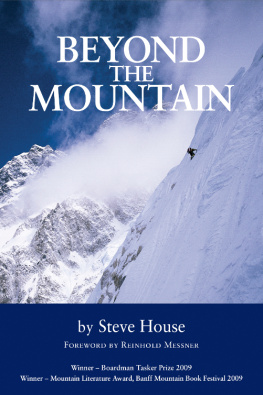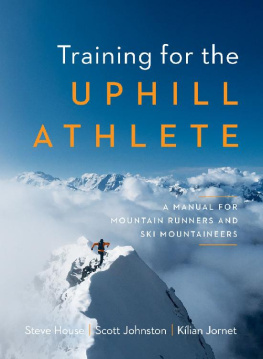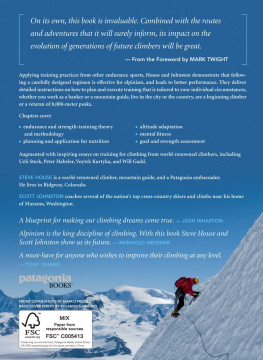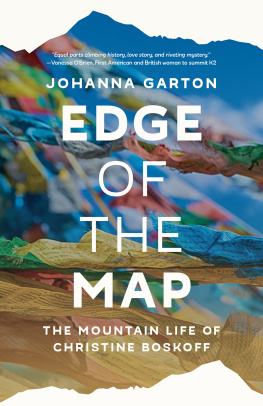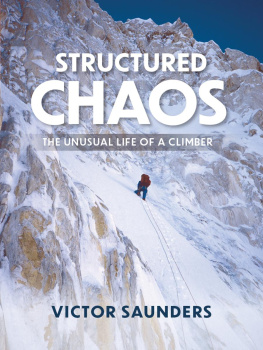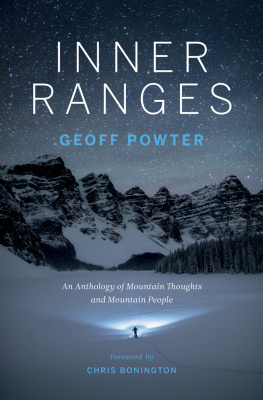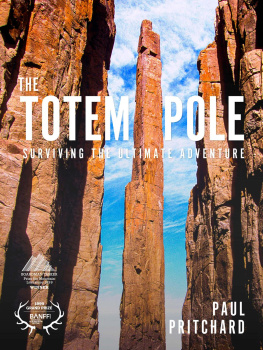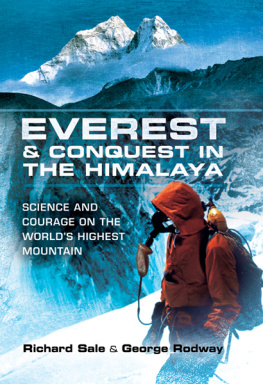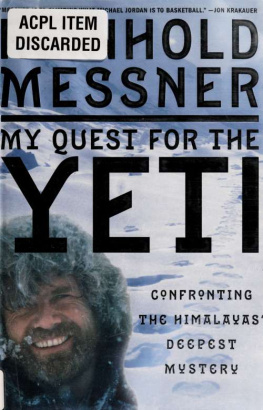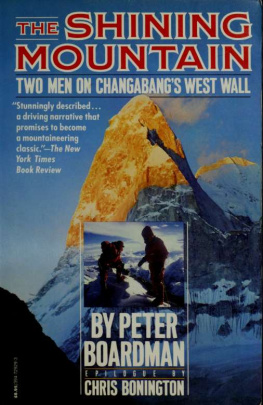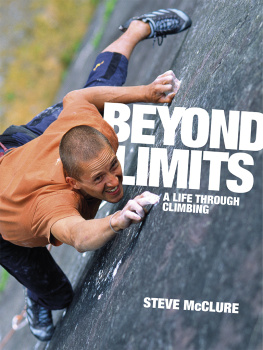To the partners with whom I lived these stories: Vince Anderson, Scott Backes, Barry Blanchard, Rolando Garibotti, Dusan Golobi, Eli Helmuth, Joe Josephson, Alex Lowe, Bruce Miller, Marko Prezelj, Branko Stari, Mark Twight, and Mira and Zdenko Zori.
These stories are as much theirs as mine.
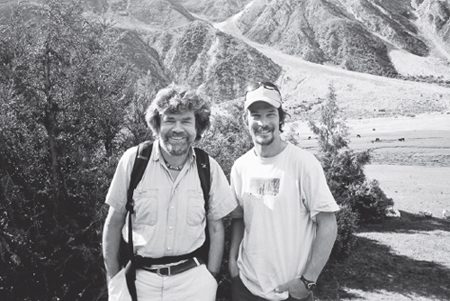
Reinhold Messner and I share the view at the Nanga Parbat Base Camp in August, 2005. Vince Anderson
FOREWORD
The Message of Steve House
I ADMIRE STEVE HOUSE for his approach to the mountains. Step by step he has become the best alpinist he can become. In my view he is at the top of mountaineering. He climbs the right routes on the right mountains in a time when everyone is climbing Everest. Often we havent even heard of the peak he is climbing on. But how, and with whom, he is climbing interests me.
In this book he gives up his experiences, his stories, his heritage. There are no words of the climax on the summit, no words of victory. Instead, Steve tells about suffering through freezing cold bivouacs, the discomfort of high-altitude, the deep emptiness after a high success.
Steve House is a great adventurer; he knows that success must never be assured. He is also a great storyteller. He tells about doing, not about morals or lessons. His commitment to his goals lets him try and try again. The times he succeeds he learns that success is as temporary as the snow in spring.
I am keen to read these stories of one of todays best climbers to know about Steves mentors; his moments of learning, evolution and revelation; his heroes and dreams; the moments he excels and when he fails; his partners and his trust in them, and his sorrow when he loses them to know about his life. These stories evoke strong emotions in me. I remember the loss of my own friends, my fears before great climbs, my care for my partners.
In this day, climbing has become a global phenomenon and most climbers around the world act like they are in a climbing movie with beautiful, colorful Gore-Tex suits and shiny aluminium. In contrast, Steve says, My most rewarding days were days when I cut away everything. And with these few words he holds the same line as Mummery, Bonatti, and Robbins. Its the style that makes the difference.
The simpler we make things, the richer the experiences become. But only if we remain active, only if we try, only if we risk and especially when we fail. Failure is a part of learning. Through our failures we learn the most. Action is the message.
Reinhold Messner
PROLOGUE
IVE NEVER BEEN A STORYTELLER. Most climbers are like me: quiet, introverted, physical people. But I wrote this book because I wanted to explain something about why I climb: to you, but also to myself.
Now that Ive finished it, I am afraid I may have failed. Failed to answer questions such as why I take deadly risks, why I leave home for months at a time, and why I routinely spend my savings on air tickets to remote lands. But I see success in degrees, and failure provides valuable lessons.
The depth of any story is proportionate to the protagonists commitment to their goal, the complexity of the problem, and the grace of the solution. Success must never be assured.
When I stood on the greatest summit Ive ever achieved, success vaporized. As many before, I learned that the moment we think we have attained the goal, we lose it. Success is empty. The sum of all our luck, judgments, lessons learned and heeded, elevation gained and lost, our fitness and skill is zero.
When I climb, I know I will descend. When I grow to love my partners I know that they may die. When I run uphill my legs first get weaker, then stronger, and eventually weaker again. The sum is zero, and so the goals become the plotlines to our lives.
The stories in this book take place between 1988 and 2008. Each time I returned to the infinite canvas of the mountains with a new goal: to plot a new route, traverse a peak, climb a route faster than anyone before, or to climb alone what had only been accomplished by a team of men. My most rewarding days were days when I cut away everything; when I redefined my understanding of necessity.
Writing these stories has been unexpectedly cathartic. I have come to a clearer understanding that climbing has the power to distill the full spectrum of life into a few days, or even a few hours. At the same time I sharpened my realization that doing climbing is the only way to understand this. My hope for Beyond the Mountain is that it inspires a few to go simply, and to climb well: to see for themselves.
Remember: the simpler you make things, the richer the experience becomes.
Steve House
Terrebonne, Oregon
U.S.A.
April, 2009
A Note from the Author
On March 24, 2010, Bruce Miller and I began to climb the north face of Mount Temple, a 6,000-foot-high Canadian limestone wall often likened to the Eiger north wall. It was our first time climbing together since our attempt on the Rupal Face in 2004. Bivouacked for the first night on a comfortable ledge, I listened attentively to Bruces stories of his baby daughters growth and his stepsons active life. I felt the bite of jealousy, which faded as I told him of my preparations for K2, the building weeks of climbing, lifting weights, running uphill. He admitted feeling a bit envious of my freedom to fully commit to climbing.
At that time I was the strongest and the best climber that I had ever been. I felt the weight of potential in every workout, every partnership, every climb. I was on the verge of a great realization a realization that came suddenly, painfully, and quite unexpectedly.
I took the lead midmorning, impatient to climb the remaining pitches, to finish the route. I rushed up 100 easy feet of climbing, and then stood below thirty feet of steep rotten rock dissected by a thin crack: typical Canadian Rockies choss. Before starting I stamped a groove into a snow mushroom on the ridge, I guided the rope through it as I worked my way up. I dug some dirt from the crack and lodged a solid nut. As I climbed this crack choked with loose rocks, I continued to add small cams for protection.
With my feet planted on the vertical wall, I began clearing the snow off of a 45-degree slab of disintegrating rock above me. I tried to dig into the loose slope with my ice tool. Then I was off. Airborne. Flying backwards through space.
At first the sensation felt familiar, comfortable; like so many hundreds of falls Id safely taken sport climbing. As I fell, I relaxed; a foothold had broken, not all that unexpected considering the bad rock quality. When my belay came tight to the gear, it started pinging out of the partially decomposed limestone.
One... two... the third cam almost held me, but as I started to slow, it too exploded out of the rock. The suddenly renewed free fall flipped me upside down and my right side crashed into something hard, something painful, and I bobbed at the end of the rope eighty feet lower than where Id started. I was close to the sloping snow ledge where Bruce stood, a mere thirty feet away. The aluminum nut Id jammed into the dirty crack had stopped me.
I hurt like I have never hurt before. I remember telling Bruce to get out the cell phone to call for help. He did not yet know how bad it was. I knew.
Over the next half hour I traversed that thirty feet while Bruce pulled me towards him. At the belay stance I lay face down in the snow and my right lung collapsed. I knew I had a flail chest. Later I would learn I had broken six ribs multiple times; two splintered into many pieces. I didnt feel the two bleeding fractures in my pelvis or the seven smaller fractures in my spine. They didnt matter because I could barely breathe. I inhaled in tiny, shallow, baby breaths.

